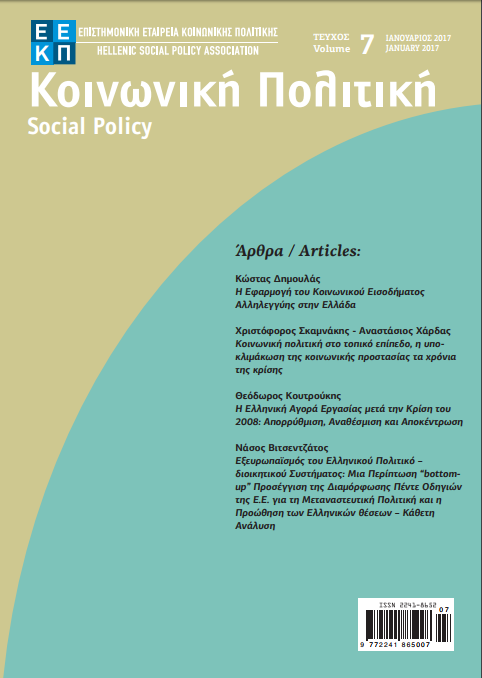Η Εφαρμογή του Κοινωνικού Εισοδήματος Αλληλεγγύης στην Ελλάδα

Abstract
The Minimum Guaranteed Income implemented in Greece -after three unsuccessful efforts - as part and parcel of its commitments to the creditors. This article investigates the main preconditions and standards of the program not only in the context of the previous initiatives but as well during its pilot and step-by-step implementation, after 2014. The main pivot of the inquiry turns around the effects of GMI on the composition of the beneficiaries and to the restructuring of the existing social protection model in Greece towards deeper residualism by downgrading furthermore the lower social strata.
Article Details
- How to Cite
-
Κωνσταντίνος Δ. (2017). Η Εφαρμογή του Κοινωνικού Εισοδήματος Αλληλεγγύης στην Ελλάδα. Social Policy, 7, 7–24. https://doi.org/10.12681/sp.14166
- Issue
- Vol. 7 (2017)
- Section
- Articles

This work is licensed under a Creative Commons Attribution 4.0 International License.
Authors who publish with this journal agree to the following terms:
Authors retain copyright and grant the journal right of first publication with the work simultaneously licensed under a Creative Commons Attribution Non-Commercial License that allows others to share the work with an acknowledgement of the work's authorship and initial publication in this journal.
Authors are able to enter into separate, additional contractual arrangements for the non-exclusive distribution of the journal's published version of the work (e.g. post it to an institutional repository or publish it in a book), with an acknowledgement of its initial publication in this journal.
Authors are permitted and encouraged to post their work online (preferably in institutional repositories or on their website) prior to and during the submission process, as it can lead to productive exchanges, as well as earlier and greater citation of published work.


